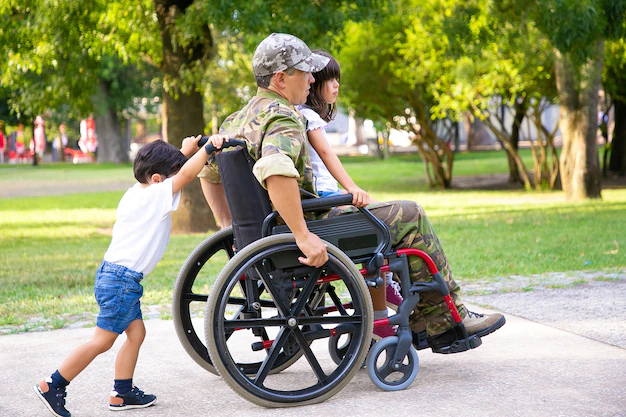Veteran Benefit Lawyers in Maine
PTSD Veterans Disability Lawyer in South Portland, ME
PTSD was largely disregarded or misunderstood by the general public, medical establishment, and military for a long time (PTSD). In the modern world, however, PTSD is now commonly recognized as a serious mental condition that may affect a person’s ability to work and interact with other people. As a veteran, you can apply for disability if you are diagnosed with PTSD.
PTSD veterans’ disability benefit process is so convoluted that even the Veterans Administration makes mistakes from time to time. This has the unfortunate consequence of denying many disabled veterans the benefits they are entitled to. A ptsd veterans disability benefits attorney can assist you to gather the proof you’ll need to prove your eligibility for veterans benefits. Jackson & MacNichol Law Firm has a long history of successfully assisting veterans in their efforts to get VA disability payments via the courts of law. For the last several years, we’ve concentrated our efforts on assisting veterans who suffer from a medical condition such as post-traumatic stress disorder.
In this article, we will discuss the following:
- What is Post Traumatic Stress Disorder (PTSD)?
- How Do You Tell If You Have Post-Traumatic Stress Disorder?
- Find your PTSD Lawyer in Maine Now!
What is Post Traumatic Stress Disorder (PTSD)?
It is not a weakness to suffer from post-traumatic stress disorder (PTSD). Combat veterans and other veterans who have undergone exceptionally traumatic incidents in service are more likely to suffer from post-traumatic stress disorder.
According to the National Center for PTSD, veterans who served in the battle for lengthy periods of time are more vulnerable to getting post-traumatic stress disorder (PTSD).
Soldiers have undoubtedly been dealing with PTSD for as long as they’ve been fighting in the war. PTSD was formerly referred to as “shell shock” or “war weariness”. After the Vietnam War, however, PTSD started to earn its due recognition.
PTSD may be caused by a variety of different things outside combat:
- Assaults, whether sexual or otherwise,
- An act of terrorism
- Traffic accidents, and other types of tragedies
- Fires, tornadoes, hurricanes, floods, and earthquakes are examples of natural catastrophes.
- Victimization as a result of early childhood sexual or physical abuse.
PTSD diagnoses among women in the military have increased in recent years. OIF/OEF saw a large number of female combatants. On convoys involved in firefights, it was not uncommon to encounter female gunners. Another issue was the high number of assaults and IEDs that struck women serving in combat support and combat service support units (CSSU). Over the last two decades, there has been a significant rise in Military Sexual Trauma (MST).
PTSD isn’t only a diagnosis for individuals who strayed beyond the boundaries of the norm. A wide range of service members, including non-deployees, have been shown to be suffering from post-traumatic stress disorder (PTSD). Even though drone operators are physically isolated from the conflict, the military has now acknowledged that they may also suffer from post-traumatic stress disorder (PTSD).
Can PTSD be considered a qualifying disability for the purposes of receiving VA disability benefits?
When it comes to PTSD, the VA has its own set of guidelines for determining eligibility for disability compensation. Veterans with post-traumatic stress disorder (PTSD) must have the disorder as a result of their service in order to be eligible for VA disability compensation.
It is necessary to show:
- clinically diagnosed PTSD in accordance with DSM-5 criteria;
- proof of an on-the-job stressor; and
- medical evidence of a relationship between the on-the-job stressor and the present PTSD diagnosis.
Most of the time, a veteran will require more evidence to support a claim regarding a distressing or traumatizing incident during military service. Documentation such as service personnel or treatment files, press stories, and witness accounts are examples of evidence that might support a claim. This additional evidence may not be necessary in other cases.
Veterans may rely on their own statements instead of supporting evidence if they were diagnosed with PTSD during service, the stressor event occurred while they were engaged in combat with hostile forces, the stressor event was connected to the veteran’s fear of actual hostile military or terrorist act, or the stressor event was connected to their time as a prisoner of war.
It is more difficult to be service-connected for PTSD than for other mental-health illnesses because of the particular standards for receiving VA compensation for PTSD. A veteran’s medical records may reveal mental health issues outside post-traumatic stress disorder (PTSD), and these may make him or her more readily eligible for VA disability compensation.
How Much Money Can I Get for Post-Traumatic Stress Disorder (PTSD)?
The VA will award a disability rating to PTSD after it has established a service connection. The VA will award you disability benefits if you have a rating of 10% or more.
Disability payments may be available to you even if your symptoms are not severe enough to earn a 100 percent disability rating if you are unable to sustain a considerable amount of productive work. As a result of their service-connected impairments, these individuals are unable to work and are given a total disability rating of zero (TDIU).
There is no difference in the way the VA assigns PTSD impairment scores to other mental-health conditions. The severity of post-traumatic stress disorder (PTSD) in a veteran may range from mild to severe, ranging from zero to one hundred percent incapacitating. An individual’s capacity to function regularly in work and social environments, as well as the intensity, frequency, and duration of their PTSD symptoms, determines their grade.
How Can You Tell If You Have Post-Traumatic Stress Disorder?
Most individuals are able to recover from a stressful event with time. Some folks, though, still feel the effects of the tragedy. The tension may potentially become worse with time.
If you were in the military and were exposed to a traumatic incident, be on the lookout for symptoms of post-traumatic stress disorder (PTSD). Generally speaking, they fall into four categories:
- Reliving – You may have “flashbacks,” “nightmares,” or “insomnia” as a result of your trauma.
- You may attempt to avoid persons or circumstances that bring up memories of the trauma. You might also attempt to avoid thinking about the incident by being too busy.
- In circumstances that bring up memories, you may feel on edge , “on guard,” or twitchy.
- Sentiments of numbness, helplessness, reluctance, or detachment from loved ones are all signs of negative thoughts and feelings. Guilt or humiliation are other possibilities.
Post-traumatic stress disorder (PTSD) may set in right away for certain military personnel who have been exposed to a terrible incident. Some veterans don’t display symptoms for months or even years after their service has ended, according to research. After a veteran is released from military service, he or she may begin experiencing symptoms.
It is recommended to seek medical attention if symptoms continue for more than a month or interfere with your relationships or capacity to earn a livelihood, according to the National Center for PTSD.
Untreated PTSD raises your risk of engaging in risky behavior like binge drinking, substance abuse, or aggressive driving, all of which may be harmful to your health.
Is Your PTSD Enough to Qualify You for Disability Benefits from Veterans Affairs?
Veterans with service-connected post-traumatic stress disorder (PTSD) are eligible for VA benefits. These tax-free monthly payments are only available to those who satisfy three criteria:
- You have been diagnosed with post-traumatic stress disorder.
- You were subjected to a stressful occurrence or “stressor” while serving in the military.
- Your PTSD diagnosis and the in-service stressor are connected by a “nexus,” or connection.
This condition cannot be met only by a veteran’s own assertions concerning a service-related stressor unless the veteran was imprisoned or otherwise subjected to a hostile environment. In most circumstances, more proof is required.
The VA will issue a disability rating depending on the extent to which your PTSD impacts your employment and social life after it has been shown to be service-connected.
For example, if you are unable to work because of flashbacks or nightmares that impair your ability to communicate with others, you may be eligible for financial assistance. However, you may not be eligible for compensation if you just have unsettling memories and they do not influence your capacity to work or your relationships with others.
Hire a VA Disability Claims Appeal Attorney for Help with Your Claim.
A key goal of the VA disability compensation program is making it easier for veterans to get VA benefits. As such, it is difficult for everyone engaged in the claims process to understand the laws and regulations.
Veterans, like the majority of the population, should not be subjected to legal proceedings without the assistance of a competent disability attorney.
Find your PTSD Lawyer in Maine Now!
Many of the lawyers at Jackson & MacNichol Law Firm have served in the military and are now assisting other veterans in obtaining the VA disability benefits to which they are entitled. Veterans who need to appeal a denial of their disability claim or whose VA disability rating is too low are typical clients for our company.
As a result, our PTSD veterans disability benefits attorney in South Portland Maine is familiar with the claims procedure, what evidence is necessary to show service-connected PTSD, as well as, how to optimize the disability rating in order to get you fair compensation when you apply for benefits.
Veterans with post-traumatic stress disorder (PTSD) are the focus of a large part of our work these days. As a result of our significant experience in PTSD, military service, and the VA appeals process, we are able to assist our clients in obtaining the benefits for veterans they are entitled to.
To get in touch with a member of our legal team, call or email us immediately. As a claimant, you won’t have to pay anything if you are applying for disability until we’re able to get you your well-deserved compensation benefits.




